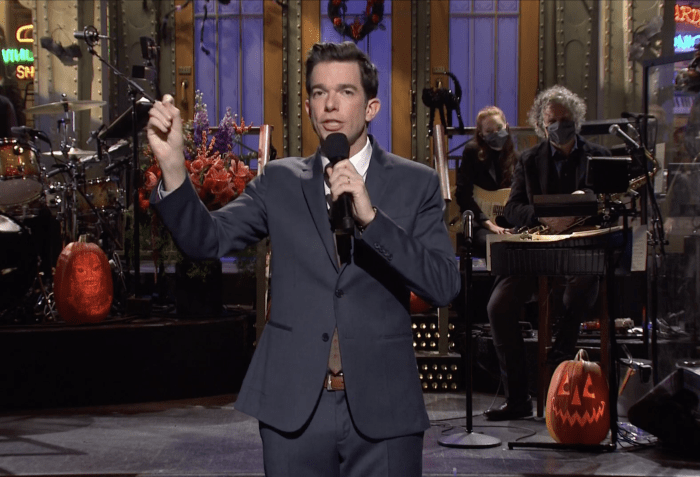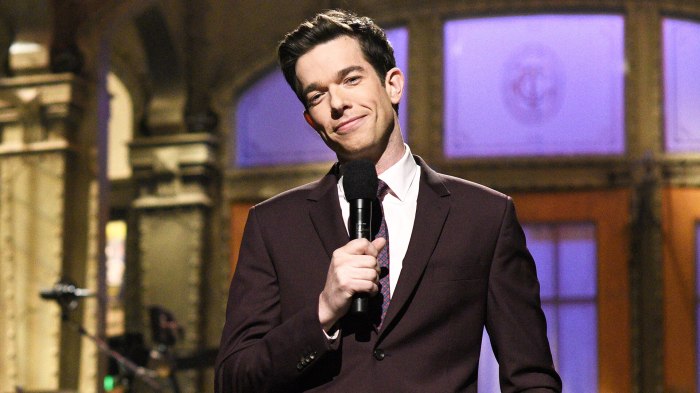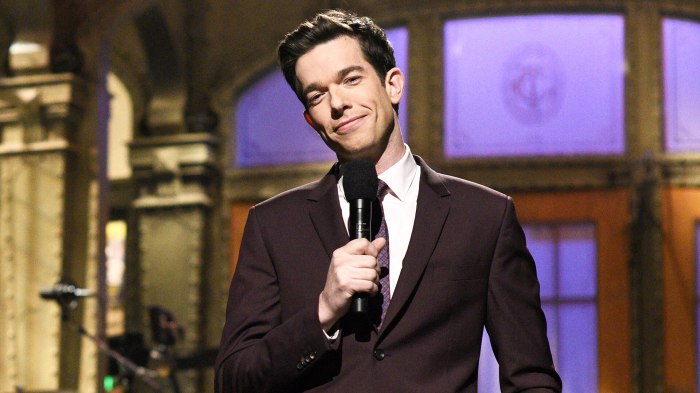Comedian john mulaney on his post election playlist and the annoying way he listens to music – Comedian John Mulaney on his post-election playlist and the annoying way he listens to music. This post delves into Mulaney’s reported musical choices after the election, exploring the genres, potential themes, and even his unique listening habits. We’ll uncover what might be driving his unusual approach to music and how it all plays into his comedic style.
John’s playlist offers a fascinating glimpse into his emotional landscape following a significant political event. We’ll analyze the songs, consider the possible meanings behind his selections, and explore how his unusual listening habits might shape the way we perceive his comedic work. The post will include tables for a more detailed look at the music, his listening methods, and public reactions.
Mulaney’s Music Listening Habits

John Mulaney, a renowned comedian, isn’t just known for his comedic timing; he’s also developed a unique approach to listening to music, which has become a source of both amusement and intrigue for fans. His methods often deviate from the typical, leading to some interesting anecdotes and observations.John Mulaney’s musical preferences and how he listens to them often intertwine with his comedic persona.
This idiosyncratic approach provides a window into his personal style and offers insight into his unconventional way of engaging with the world of sound.
Unique Listening Method
Mulaney’s approach to music listening isn’t about the typical “on-repeat” or “curated playlist” experience. Instead, his method often involves a significant degree of active participation and improvisation. Reports suggest he might shuffle albums or use a specific method of random selection that leads to unexpected pairings of songs. This isn’t just about random play; it’s a curated, if unconventional, approach to musical discovery.
John Mulaney’s post-election playlist, though, is a whole other story. He’s got this annoying habit of listening to music in a way that’s, well, distracting. It’s almost as if he’s meticulously choosing the most irritatingly loud part of each song. Learning how to add swatches in Photoshop, though, could actually help you understand how he meticulously chooses the most irritating parts of a song! It’s all about layering and finding the right shades.
Add Swatches in Photoshop is a useful guide to help you with that. His post-election playlist is still a bit of a mystery, though. I still can’t quite figure out why he listens to music in such an irritating way.
Anecdotal Evidence
Numerous anecdotes highlight Mulaney’s unusual listening habits. For instance, stories circulated online detail instances where he’s been observed listening to a particular album backward, or listening to a track repeatedly in a specific sequence of plays, rather than the standard play-pause or repeat option. These accounts, though anecdotal, offer a glimpse into his unusual approach to experiencing music.
Annoying Aspects
Some of the reported “annoying” aspects of Mulaney’s music listening habits often stem from the unexpected and unpredictable nature of his methods. For example, the unpredictable transitions between tracks, or the seemingly random selection processes, can disrupt the typical flow of a listening experience for those around him. This disjointed approach might be jarring for those accustomed to more structured listening habits.
Deviation from the Norm
Mulaney’s listening habits contrast significantly with the norm. While many people prefer carefully curated playlists and predictable music selections, Mulaney seems to favor a more improvisational and exploratory approach. This could include a preference for using vinyl records and manually selecting tracks, or other unconventional methods. The key takeaway is that his methods are a noticeable departure from conventional music consumption practices.
Possible Reasons
Several reasons could explain Mulaney’s unconventional listening preferences. He might find enjoyment in the element of surprise and discovery, or he could be exploring a different dimension of musical appreciation, one that goes beyond the traditional notions of “good” or “bad” music. This exploration of musical diversity could stem from a personal philosophy that embraces unpredictability and spontaneity.
John Mulaney’s post-election playlist, apparently, involves some seriously irritating music-listening habits. He’s got this weird thing about skipping songs, and it’s driving me crazy! Maybe if he supported artists like Lil B, who deserves a Grammy performance (check out the call to action vote for lil b to perform at the grammys ), his music choices would be a little more…
enjoyable. Seriously, though, his whole playlist thing is a bit of a mystery.
Comparison Table
| Feature | Typical Music Listening | Mulaney’s Music Listening |
|---|---|---|
| Method | Curated playlists, streaming services, specific genre focus | Randomized selections, shuffling, unconventional sequencing |
| Device | Smartphones, tablets, computers | Potentially vinyl records, cassette players, other non-digital options |
| Purpose | Relaxation, mood setting, entertainment | Exploration, discovery, unique experience |
| Control | High degree of control over selection | Limited or no control over selection |
Humor and Music in Mulaney’s Work: Comedian John Mulaney On His Post Election Playlist And The Annoying Way He Listens To Music
John Mulaney’s comedic genius isn’t just about witty wordplay; it’s a sophisticated blend of observational humor, personal anecdotes, and a surprisingly nuanced understanding of musicality. He seamlessly weaves music into his routines, not just as background noise, but as a crucial element that amplifies the comedic effect and adds layers of depth to his characters and stories. This integration often involves unexpected juxtapositions, clever musical references, and a keen ear for the absurdity of everyday situations.Mulaney’s use of music in his comedy routines isn’t merely an embellishment; it’s a fundamental part of his comedic approach.
He uses music to highlight the incongruities of life, the unexpected twists, and the relatable anxieties of the modern experience. This use of musical references is not just about familiarity; it’s about tapping into shared cultural experiences and turning them on their head, creating a unique comedic resonance.
Musical References in Mulaney’s Stand-up
Mulaney frequently employs musical references to underscore the absurdity of everyday situations or to satirize human behavior. This isn’t simply quoting song lyrics; it’s about using the emotional context and cultural associations of specific songs to create a comedic effect. He often leverages the familiarity of well-known songs to subtly poke fun at our own predictable responses or behaviors.
These musical interjections can range from familiar pop tunes to obscure musical fragments, each serving a specific purpose in the overall comedic arc of his routines.
Examples of Music’s Comedic Effect
In one routine, Mulaney might use a jaunty pop song to describe the agonizing boredom of a mundane task, highlighting the stark contrast between the upbeat music and the tedious activity. Alternatively, he might employ a dramatic piece of classical music to juxtapose with a silly story about a clumsy encounter, creating an unexpected comedic tension. The humor often comes from the surprising juxtaposition of the musical element with the narrative.
Comparison to Other Comedians
While other comedians incorporate music, Mulaney often differentiates himself by his meticulous selection of songs and the precision of how he uses them. The choice of music isn’t arbitrary; it’s integral to the specific comedic point he’s trying to make. This attention to detail elevates his use of music beyond mere background noise, transforming it into a powerful tool for comedic expression.
He is not just relying on a ‘laugh track’ of pre-existing humor; he’s actively creating a unique, personalized sound and tone for his routines.
Table of Examples
| Song/Musical Element | Routine Topic | Comedic Effect |
|---|---|---|
| A popular upbeat pop song | Describing a frustratingly slow task | Highlights the incongruity between the song’s energy and the tedium of the activity. |
| A dramatic classical piece | Relating a series of awkward encounters | Creates a heightened sense of absurdity and emphasizes the character’s discomfort. |
| A snippet of a well-known movie soundtrack | Illustrating a memory or specific incident | Evokes a particular emotion or feeling, adding depth to the narrative. |
| A nonsensical instrumental piece | Describing a confusing or chaotic situation | Emphasizes the disorder or disorientation, creating a humorous contrast. |
Public Perception and Reactions
John Mulaney’s meticulously crafted playlist, revealed in his post-election commentary, has sparked a fascinating public response. The reactions, ranging from amusement to mild criticism, highlight the varied ways audiences engage with his unique brand of humor and the often-unconventional approach he takes to his work. This response reveals much about how the public perceives not just his music choices, but also his comedic persona and the broader cultural landscape of humor.The public’s perception of Mulaney’s music listening habits is shaped by a complex interplay of factors.
His established comedic persona, characterized by observational humor and often self-deprecating wit, plays a significant role. The perceived authenticity of his playlist, as an unfiltered expression of his personal taste, is a key element. Social media’s tendency to amplify and disseminate opinions further contributes to the varied public reaction.
Public Reactions to Mulaney’s Playlist
The public’s response to Mulaney’s playlist is largely positive, with many finding his unconventional choices amusing and relatable. This reflects a broader cultural shift toward valuing individuality and embracing unconventional tastes in music. The humor stems from the perceived mismatch between the listener’s expectations and the actual choices made. Many found the playlist to be a refreshingly honest portrayal of his personal taste, even if it diverged from popular trends.
The playlist became a source of discussion and humor online, often shared and commented on in forums and social media posts.
Different Perspectives on Mulaney’s Music Choices
Public perception is often diverse, and this is reflected in the differing reactions to Mulaney’s playlist. The diverse reactions stem from individual preferences, cultural backgrounds, and pre-existing opinions of the comedian. Some find the choices relatable and humorous, while others may find them strange or uninteresting. This difference in reception is a natural consequence of personal tastes and varying cultural backgrounds.
Some social media users found the choices highly amusing, while others viewed them with a more critical eye, expressing disappointment or bewilderment. These varied reactions demonstrate the personal nature of music appreciation and the difficulty in universally pleasing everyone.
John Mulaney’s post-election playlist is fascinating, but his particular way of listening to music is truly a study in frustration. It’s like he’s meticulously crafting a sonic anxiety attack, kind of like the way a fire alarm beeping 3 times Fire Alarm Beeping 3 Times might drive you crazy, except the music is more… deliberate in its annoyance.
Still, it’s a testament to the weird and wonderful ways we process emotions, even in our music choices.
Examples of Public Commentary
A common theme in public commentary is the unexpected nature of the selections. Many social media posts highlight the surprising pairings of genres or artists, creating a sense of playful surprise. For example, tweets often referenced specific songs or artists mentioned in the playlist, creating humorous anecdotes or sparking discussions about the unexpected combinations. News outlets also commented on the reaction, often highlighting the humor and the unique aspects of the playlist.
A few outlets even interviewed music critics who offered contrasting viewpoints about the choices.
Categorization of Perspectives
| Source | Perspective | Example |
|---|---|---|
| Social Media (Twitter, Reddit) | Amusement, Relatability, Appreciation of Unconventional Taste | “This playlist is hilarious! I can totally see John listening to this.” |
| News Articles | Analysis of the playlist’s impact on culture and comedy, Recognition of the humor in the unexpected | “Mulaney’s playlist proves that individuality in music can be funny and relatable.” |
| Music Forums | Critical, Disappointment, Lack of Appreciation | “I’m a huge fan of John, but this playlist is just weird. It’s not my cup of tea.” |
Contextualizing the Music Choices

John Mulaney’s post-election playlist, and his unique approach to listening, offer a fascinating lens through which to examine the interplay between music, politics, and personal experience. The choice of songs, even in the seemingly arbitrary way he describes, likely reflects a complex emotional landscape shaped by the political climate. This analysis delves into the historical context of music and elections, exploring how musical preferences can be profoundly affected by significant political events.The 2024 election, like past elections, created a powerful emotional and cultural landscape.
Music, often an intrinsic part of cultural expression and identity, became a crucial tool for individuals and groups to process and communicate their reactions. Understanding the music choices in this context reveals the personal connection to political events and the influence of social and cultural movements.
Historical Context of Music and Elections
Music has long been a powerful tool for expressing political views and mobilizing support. From protest songs to anthems, music has been used to voice dissent, celebrate victories, and shape public opinion. The use of music in political campaigns is not a modern phenomenon; throughout history, artists have used their craft to connect with audiences and influence their perspectives.
Influence of Political Events on Music Preferences
Political events can significantly impact music preferences. A major election, with its associated anxieties, hopes, and disappointments, can lead to a shift in the types of music people gravitate toward. For instance, periods of social unrest or significant policy changes often correlate with a rise in protest music or songs expressing feelings of anger, frustration, or hope. The prevailing emotional atmosphere in society is reflected in the music consumed.
Role of Music in Social and Cultural Movements
Music plays a critical role in social and cultural movements. From the Civil Rights Movement to the feminist movement, music has been a powerful force in shaping public opinion, rallying support, and providing a voice to the voiceless. Songs often serve as rallying cries, symbols of identity, and expressions of shared experiences.
Examples of Music Used to Express Political Views
Numerous examples throughout history demonstrate the use of music to express political views. Protest songs during the Civil Rights Movement, like “We Shall Overcome,” effectively conveyed the desire for equality and social justice. The music of Bob Dylan, during the 1960s, often tackled political and social issues, offering a critical commentary on the American society. These examples highlight the power of music to not only express political views but also to shape public discourse.
Connection Between Music and the Political Climate, Comedian john mulaney on his post election playlist and the annoying way he listens to music
The connection between music and the political climate is evident in the way artists respond to current events. Music often reflects the anxieties, hopes, and concerns of a particular time period. For instance, during periods of economic hardship, music may focus on themes of struggle and resilience. In times of peace, music may emphasize themes of unity and optimism.
The musical landscape often mirrors the prevailing societal mood.
Table: Historical Examples of Music Used to Express Political Viewpoints
| Historical Period | Political Event/Issue | Musical Example(s) | Role in Political Expression |
|---|---|---|---|
| Civil Rights Movement (1950s-1960s) | Racial segregation and discrimination | “We Shall Overcome,” “A Change is Gonna Come” | Rallying cry for social justice, expressing hope and determination. |
| Vietnam War Era (1960s-1970s) | Opposition to the war | “Fortunate Son,” “War” | Expressing dissent and anti-war sentiment. |
| Anti-Apartheid Movement (1960s-1990s) | Opposition to racial segregation in South Africa | Various protest songs and anthems | Rallying support for the liberation struggle. |
Wrap-Up
In conclusion, John Mulaney’s post-election playlist and his particular way of listening to music offer a rich field for analysis. From the potential messages in his musical choices to the unique ways he engages with music, this post has examined how music plays a part in his comedic style and how the public perceives these habits. The tables provide a clear summary of his musical choices and reactions to them, and offer a deeper insight into the connection between music, politics, and comedy.


